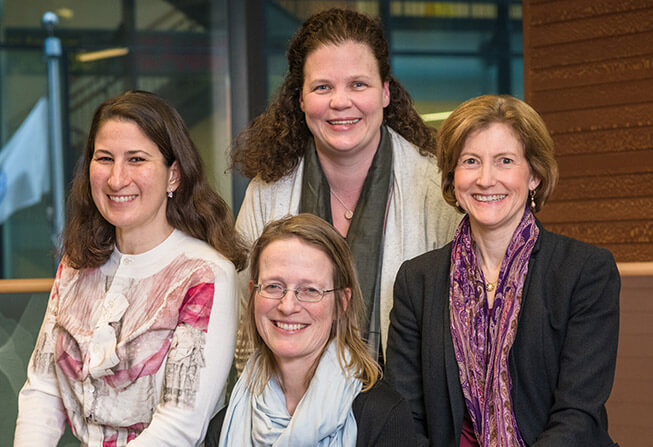A cancer diagnosis can affect every area of a person’s life, and many experiencing it for the first time can feel lost about how to manage the changes it brings. That’s where social workers step in.
Social workers have been part of patient care at Dana-Farber since its very founding. The Institute’s very first social worker, Antoinette Pieroni, recalled that when she was hired, Farber told her she was to make rounds with the medical staff every morning and see every new patient in the clinic. Such regular contact between patients and a social worker was unheard of at the time.
Today, it is virtually a universal practice and at Dana-Farber, social workers inhabit a large variety of roles, ultimately supporting patients of all kinds in and outside the clinic.

What can social workers help with?
Support from social work has been found to improve health-related outcomes for patients and families. Social workers help with a wide variety of issues and are a wealth of knowledge when it comes to interventions and resources that can help patients and caregivers during treatment. Some of the areas they can help with include:
- Depression and anxiety
- Distress in response to diagnosis and treatment
- Concerns about drug and alcohol use
- Impact of cancer on family and caregivers
- Discussing your illness and treatment with children
- Coping with advanced cancer and facing uncertainty
- Impact of cancer on work, school, and finances
- Advance directives conversations and completion
- End of life discussions
- Grief and bereavement support
Social workers who specialize in you
Social workers at Dana-Farber specialize in types of cancer and a patient’s background because everyone faces their own unique set of challenges.
For example, patients with breast cancer or prostate cancer can have pressing questions and concerns around fertility, sexual health, relationships, and body image. Alternatively, patients with colon cancer can have specific worries around procedures like colostomies, which will result in permanent lifestyle changes.
Support for pediatric patients and young adults
Additionally, cancer can affect patients and caregivers at any age and can come with unique challenges given where the patient is in their life. For example, Rebecca Morse, LICSW, specializes in pediatric survivorship and support patients entering adulthood that experienced cancer as children.
“I try to help them cope with their cancer history,” she says.
Coming back to clinic for appointments can be like returning to a traumatic experience for many young survivors to the point where they are avoided entirely. Morse helps set up a network of resources to address any emotional or physical barriers to returning to the clinic.
This population of patients has often missed major developmental stages that children without cancer take for granted from prom to graduation. As they navigate the adult world, Morse helps them work on strategies for disclosing cancer history and working through differences they may feel compared to their peers.
For young adult patients facing a new diagnosis, cancer can pose a risk to their professional life or put a wrench in plans for starting a family.
Improving the patient experience for all
Social workers are consistently working with patient care staff to improve the experience of patients with differing abilities. A perfect example of this is the work that Melissa Levin, LICSW, is doing with the Neuro-Inclusive Oncology Care and Empowerment Program at Dana-Farber.
Levin supports patients through one-on-one counseling like many other social workers, but she also works to help patients who are neuro-diverse, including those with autism, cerebral palsy, or down syndrome.
This can involve some simple adjustments that go a long way. Many neurodivergent people struggle with sensory anxieties triggered by loud noises, bright lights, and room temperatures. Others may need extra support in understanding the procedures they’re undergoing.
“People have different learning styles and sensitivities,” Levin explains. “To help these patients feel supported, we make changes wherever we can and generally increase awareness. It’s a powerful strategy that really lowers barriers to accessing care.”
Beyond the clinic, Levin’s work involves empowering people with disabilities to communicate with their providers and to create a receptive environment for that communication. There are so many ways that neurodivergence can present itself and creating a supportive environment is key to successful oncologic care.
Connecting with a social worker
If you or a loved one may benefit from speaking with a social worker, talk to your care team, who will be able to refer you to a social worker who will best fit your needs. Alternatively, you can also reach out yourself.
